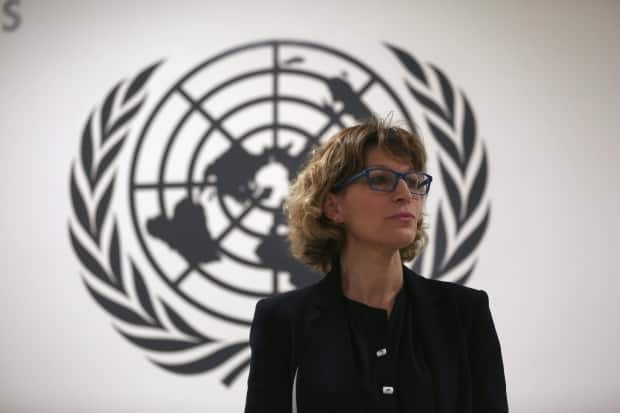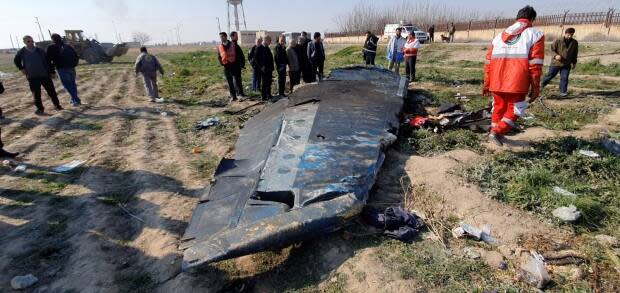UN experts probing destruction of Flight PS752 accuse Iran of breaking international law

(Jose Cabezas/Reuters - image credit)
Iranian authorities committed multiple violations of human rights and international law in the lead-up to and aftermath of the destruction of Ukranian International Airlines Flight PS752, according to the results of a damning investigation by two United Nations experts.
Shortly after taking off from a Tehran airport on Jan. 8, 2020, the plane was shot down by two surface-to-air missiles launched by the Iranian Revolutionary Guard Corps (IRGC). The attack killed all 176 passengers and crew members aboard, including 138 people with ties to Canada.
Agnès Callamard, the UN special rapporteur on extrajudicial, summary or arbitrary executions, released today the results of a six-month investigation into the event that call into question the findings of the official Iranian investigation.
Callamard concluded that Iran violated the "right to life" of those 176 people by resorting to lethal force and failing to take proper precautions while allowing military units to operate so closely to civilian aircraft — at a time when the country was experiencing heightened military tensions with the U.S.
Callamard also said the rights of many of the victims' family members were violated when they were denied access to the crash site and subjected to harassment by Iranian authorities for speaking out.
"As a result of these systematic violations and failures by the Iranian authorities to meet their human rights obligations, 176 lives were lost and many more were harmed as a result of what happened after the strike," said Callamard during a virtual press conference today.
"The families of the victims and, indeed, Iranian society ... are left without the answers they deserve. They are left churning over and over again in their minds: how could this have happened?"
WATCH | UN experts says Iran broke international law after downing of Flight 752:
Callamard faulted Iran for failing to close its airspace even though there was a possibility of a U.S. attack, saying this amounted to a "failure to protect" under international human rights law.
The Iranian military was on high alert at the time of the incident because of the assassination of Iranian Gen. Qassem Soleimani in a U.S. drone strike five days earlier, and a subsequent retaliatory attack by Iran on U.S. bases in neighbouring Iraq.
Callamard said the apparent lack of co-ordination between civilian air authorities and Iranian military units — which had moved a number of anti-aircraft guns into the area near the airport — revealed a deep failure of the chain of command in both.
Inconsistencies in Iranian investigation
An Iranian investigation found that the IRGC military personnel who launched the missiles mistook the civilian aircraft for an incoming U.S. missile.
But Callamard said the Iranian investigation did not meet international standards.
In December, she sent a letter to the Iranian government detailing her observations and posing questions about the missile strike. Iran has yet to respond to the letter, which was made public today.
Callamard's letter describes a number of inconsistencies she said raise questions about the official account:
The Iranian investigation said a military commander launched both missiles at the plane without proper authorization. Callamard wrote that the investigation failed to explain why military personnel wouldn't be informed that the plane was set to take off.
Iran alleged an error in the alignment of the mobile missile unit contributed to the mistaken targeting of the plane. Callamard said Iran hasn't properly explained how the radar miscalibration occurred, how it led to the targeting of the aircraft, and why it wasn't detected.
Callamard said Iran's investigation didn't explain why standard procedures for evaluating a potential target weren't followed by IRGC military personnel — such as monitoring altitude, climb, descent rate or airspeed to evaluate the target's size, or checking the target visually.
Callamard said Iran hasn't properly explained why other planes took off without incident that night.
The IRGC Aerospace Force Commander has said the military unit had only 10 seconds to decide to whether to fire. Callamard said her investigation showed the unit had at least a 45 seconds to evaluate the target.
Callamard said while she did not find any concrete evidence that the plane was shot down intentionally, the Iranian investigation had not proved beyond a reasonable doubt that it wasn't targeted.
"The inconsistencies in the official explanation and the reckless nature of the mistakes have led many, including myself, to question whether the downing of Flight PS752 was intentional," she said.
"The information released thus far makes it impossible to answer many basic questions and clarify conjectures. Without answers, suspicion that civilians were intentionally targeted will remain."
Callamard told CBC News by email her investigation included reviewing all of the available documentation originating in Iran, reviewing technical and military information about the missile units, interviewing a large number of radar and military experts, and analyzing all the information against a legal framework.

Questions of credibility
Canada has raised questions about Iran's credibility regarding the PS752 investigation.
Prime Minister Justin Trudeau's special adviser on the file, Ralph Goodale, has said Iran's pattern of behaviour has convinced Ottawa it can't trust its version of events.
In December, Goodale issued a report saying that Iran should not be left in charge of the investigation since its military caused the deadly crash in the first place.
Canada also has created a team, led by a former CSIS director, to try to piece together the sequence of events — despite having no access to the crash site, the evidence gathered by Iranian authorities, witnesses or the accused.
Payam Akhavan, a former UN prosecutor at The Hague, told CBC News that the UN report corroborates many of Goodale's concerns.
He said the fact that that a UN investigator for arbitrary executions pursued an investigation into Flight PS752 is quite significant.
"Typically, when we're talking about arbitrary or extrajudicial executions — we're talking about someone being lined up and shot and executed," said Akhavan.
"The mere fact that the special rapporteur has pursued this investigation signals her preliminary view that ... the steps taken resulting in its destruction represent a situation where death was foreseeable and preventable."
Akhavan said the report will likely be tabled with the UN Human Rights Council and could be used in the future as the foundation of a human rights resolutions adopted by the UN General Assembly or as evidence in international legal proceedings.
Hamed Esmaeilion, who lost his wife and daughter, on Flight PS752, said the UN report shows the importance of the case.
"I think it's a turning point," said Esmaeilion, who has become a spokesperson for victims' families in Canada.
WATCH | Goodale says Iran should not be investigating Flight 752 crash:
He said it's now time for the International Civil Aviation Organization, the UN, and the five countries that lost citizens to take action. He said the families want the case taken to the International Court of Justice.
"We're frustrated," he said. "We've been waiting for reaction. We want to see words turn into action. We're alive and we want to see truth and justice one day."
Following the report's release, Goodale told CBC News the Canadian government would review the report carefully. He said that while the UN process is separate from Canada's examination, it raised many of the same unanswered questions as the ongoing Canadian one.
"If Iran wishes to provide solace to the grieving families and gain credibility in the international community, it is incumbent upon them to fully answer the probing question the world is asking and to provide the hard evidence upon which those answers are based," Goodale wrote in an email.

